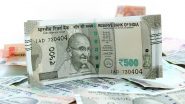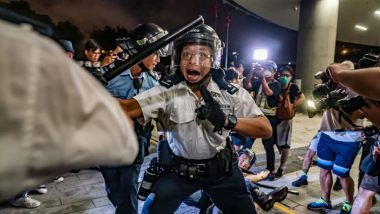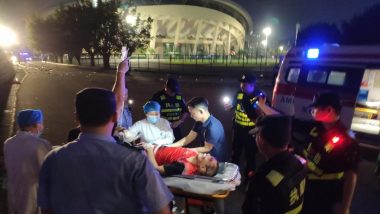Hong Kong, June 12: Tens of thousands of protesters paralysed central Hong Kong on Wednesday, blocking major roads in a defiant show of strength against government plans to allow extraditions to China. Black-clad demonstrators, most of them young people and students, surrounded government offices, bringing traffic to a standstill as they called on authorities to scrap the Beijing-backed law. Rows of riot police were far outnumbered by protesters -- many who wore face masks, helmets or goggles -- just hours ahead of a scheduled debate in the city's legislature.
By late morning, with crowds swelling, officials in the Legislative Council (Legco) said they would delay the second reading of the bill "to a later date". In scenes echoing the Occupy movement in 2014 that shut down swathes of the city for months, people flooded major roads and junctions in the heart of the city, dragging barricades onto highways and tying them together. Others plucked loose bricks from pavements. Hong Kong Erupts in Protests As China Brings in Law for Extradition of Persons on Trial.
Some protesters in cars deliberately stopped their vehicles in the middle of one key artery and jumped out, blocking the road. Police used water cannons and pepper spray on protesters outside the Legco building and held up signs warning demonstrators they were prepared to use force.
Organisers of a gigantic march on Sunday said more than a million people turned out to voice their objections to the proposed law, which would allow Hong Kong to send suspects to other jurisdictions around the world -- including China. But the record numbers failed to sway pro-Beijing chief executive Carrie Lam, who has rejected calls to withdraw the bill.
Matthew Cheung, the city's chief secretary, called on demonstrators to unblock key arteries and withdraw, in the first official reaction to the latest protests. "I also urge citizens who have gathered to show restraint as much as possible, disperse peacefully and do not defy the law," he said in a video message Wednesday.
Many opponents are fearful the law would entangle people in the mainland's opaque courts, leaving them vulnerable to a justice system seen as acting at the behest of the Chinese Communist Party. More than 100 Hong Kong businesses said they would close Wednesday in a sign of solidarity with the protesters, and the city's major student unions announced they would boycott classes to attend the rally.
A string of other prominent unions in the transport, social work and teaching sectors either followed suit or encouraged members to attend, while a bus driver union said it would encourage members to drive deliberately slowly to support protests. "It's the government who has forced people to escalate their actions, so I think it's inevitable for the fight this time to get heated," said protester Lau Ka-chun, 21.
News of the postponed debate did not deter crowds swelling throughout Wednesday. "It's not enough to delay the meeting," said student Charles Lee, 23. "Stalling is not our ultimate goal. We need them to consider scrapping it... Clashes are unavoidable if they adopt this attitude towards their citizens."
A note from protesters circulating in a Telegram messaging group threatened a series of consequences -- including storming the Legco buildings, paralysing public transport, surrounding the houses of cabinet members and continuing to occupy the roads -- if the bill is not withdrawn by 3:00 pm (0700 GMT).
Lawmakers had been due to debate the bill on Wednesday morning in the city's legislature, which is dominated by Beijing loyalists, with a final vote expected on June 20. It was not announced when the next meeting on the bill would be held. "The only responsible thing to do now is for Carrie Lam to withdraw the evil bill, or at least to shelve it in order to solve the crisis," said pro-democracy lawmaker Fernando Cheung.













 Quickly
Quickly




















